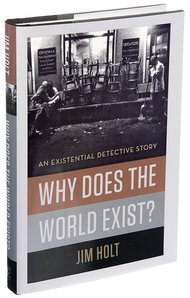One of the perks of writing a blog is that sometimes publishers offer to send you copies of new books. Sadly, they are mostly not the books that I actually want to read.
But here’s one that was really enjoyable, but was also (tangentially) relevant to this blog. So here’s a brief review – consider it an advertorial 🙂
The book Why does the World Exist? is framed as an ‘existential detective story’. Basically what this means is that the writer, Jim Holt, has shuttled around the world chatting to a bunch of intellectuals (mostly philosophers, but the occasional scientist and even one or two theologians) who give their spin on the question.
Now, the idea that Holt set out on a pilgrimage of enlightenment in the way depicted in the book is clearly a bit of narrative fiction. It’s obvious from the way he writes that the guy knows his stuff, and I’m sure he knew pretty much what he was going to hear each of them say before he met them. But it’s a fiction that works well, and makes the book very readable despite what are often pretty tough topics.
The questions he starts off with were not what I was expecting at all – what is nothing, and is it actually possible for nothing to exist? What does it mean to say that A causes B, and does A have to precede B in order to cause B?
That last point turns out to be pretty critical to the whole story.You see, Holt’s not interested in what caused the universe to exist – well, he is but, as the Oxford Quantum Theorist David Deutsch points, the problem with conventional explanations is that even if you find an explanation, it needs to have some context. There’s always the problem of why this explanation and not some other explanation.
That, of course, is the problem with using the existence of the universe to argue for the existence of God. What explains the existence of God and, as importantly, why this God and not some other God?
The theological explanations (from Richard Swinburne and John Leslie) were not terribly convincing. But what I liked about this book is that Holt treats all the arguments put forward with a great deal of sympathy. He carefully explains why it is that they might be right – sometimes to the point where I was on the verge of putting the book down in exasperation – before methodically pulling the arguments to pieces!
If you are into this sort of stuff, then many of the themes (Anslem’s and Goedel’s arguments, the many worlds hypothesis, platonic forms etc) will be familiar to you. But even when I knew the philosopher and the argument, I found myself enjoying the ride because Holt really has a gift for writing about these topics. There are some tough concepts to digest, but Holt paces it well and keeps it interesting.
I’m sure I won’t be spoiling the story if I reveal to you that, sadly, Holt does not reveal the mystery of existence at the end of the book.
However, he does get rather closer than I was expecting. At least now I have some idea what kind of explanation could possibly suffice. And that’s got to be a step forward!
 This article by Tom Rees was first published on Epiphenom. It is licensed under Creative Commons.
This article by Tom Rees was first published on Epiphenom. It is licensed under Creative Commons.














